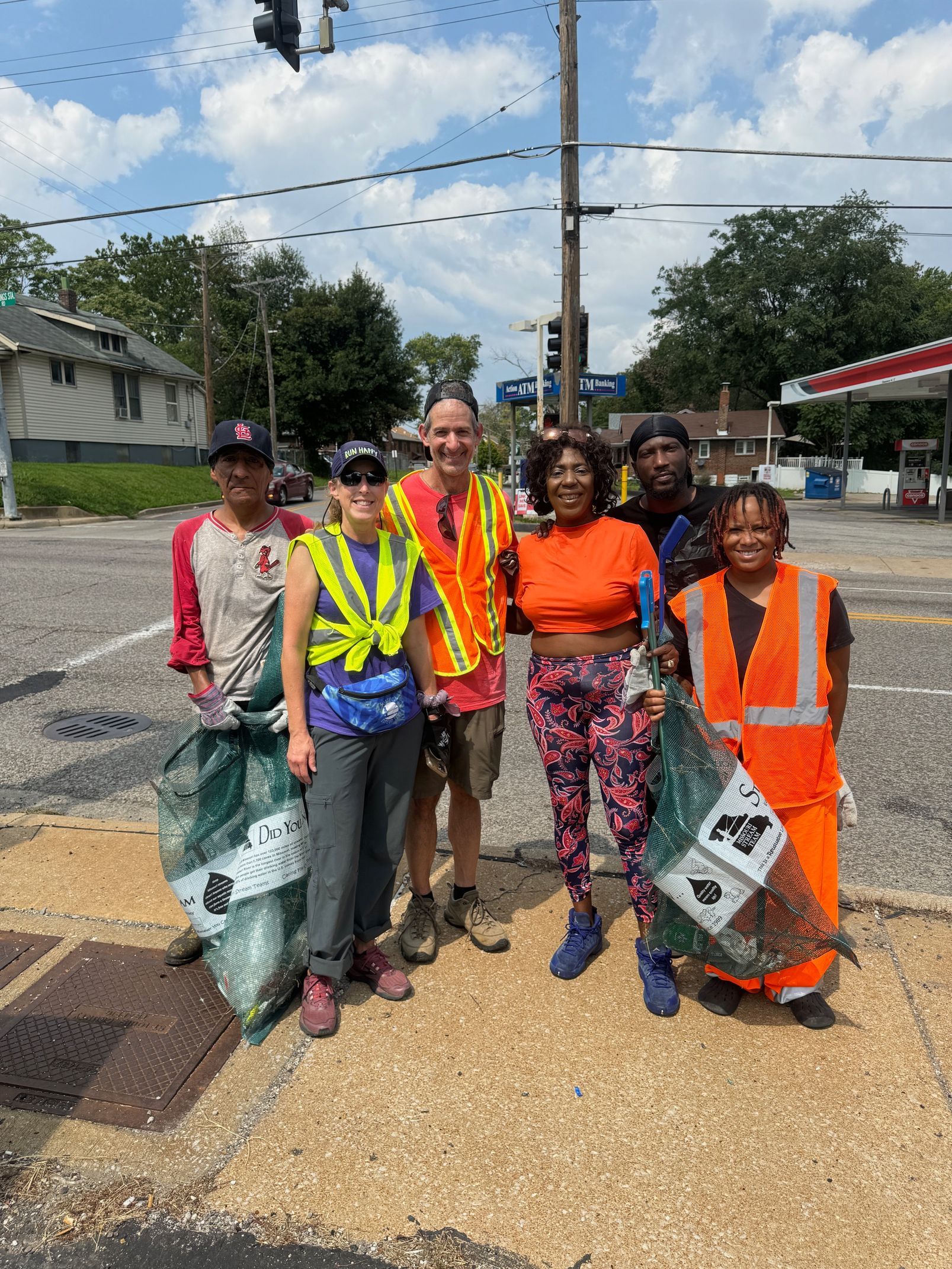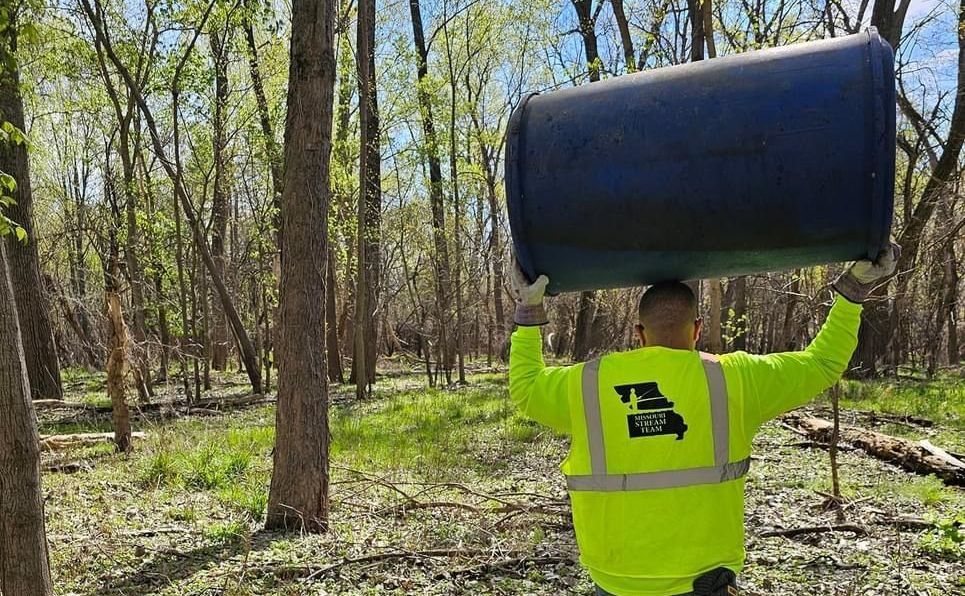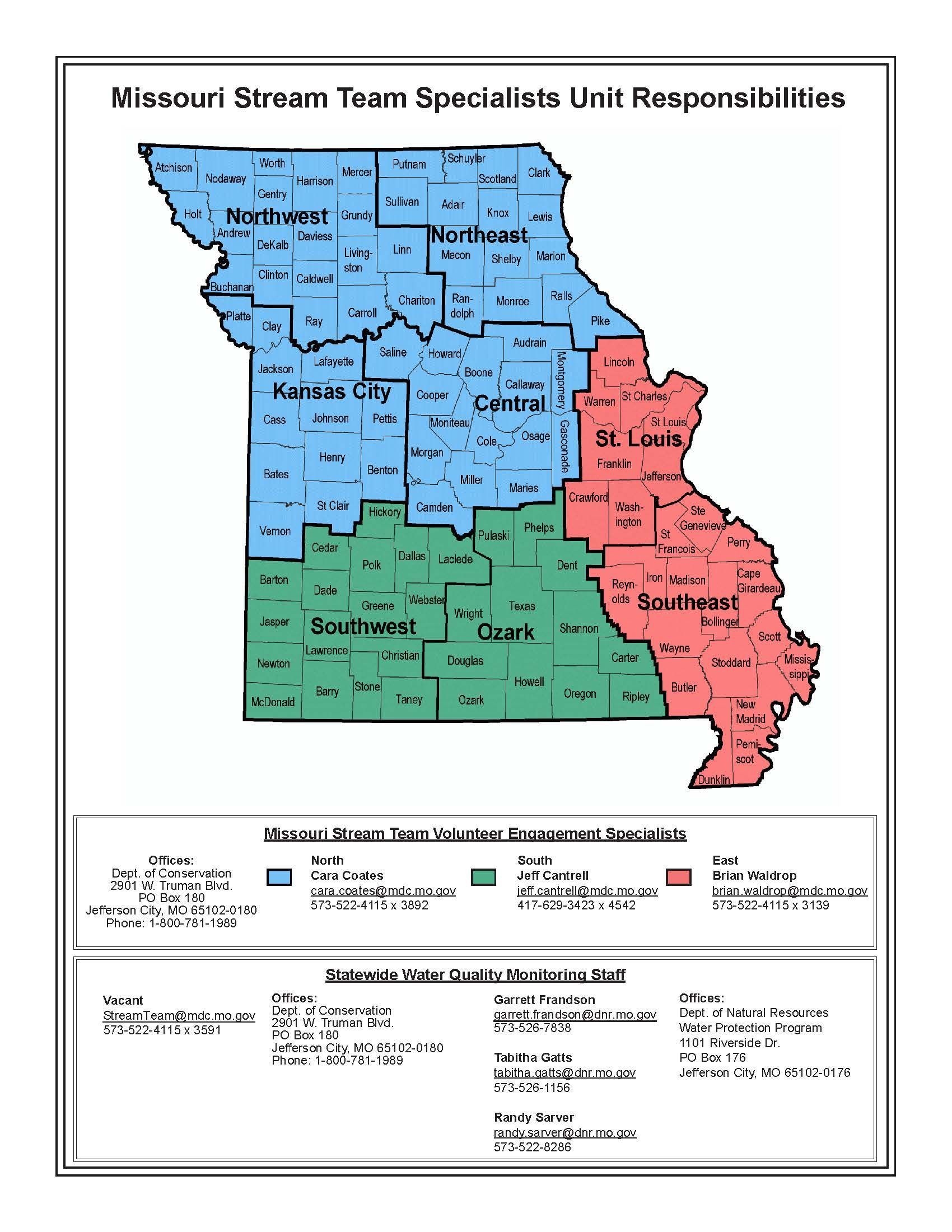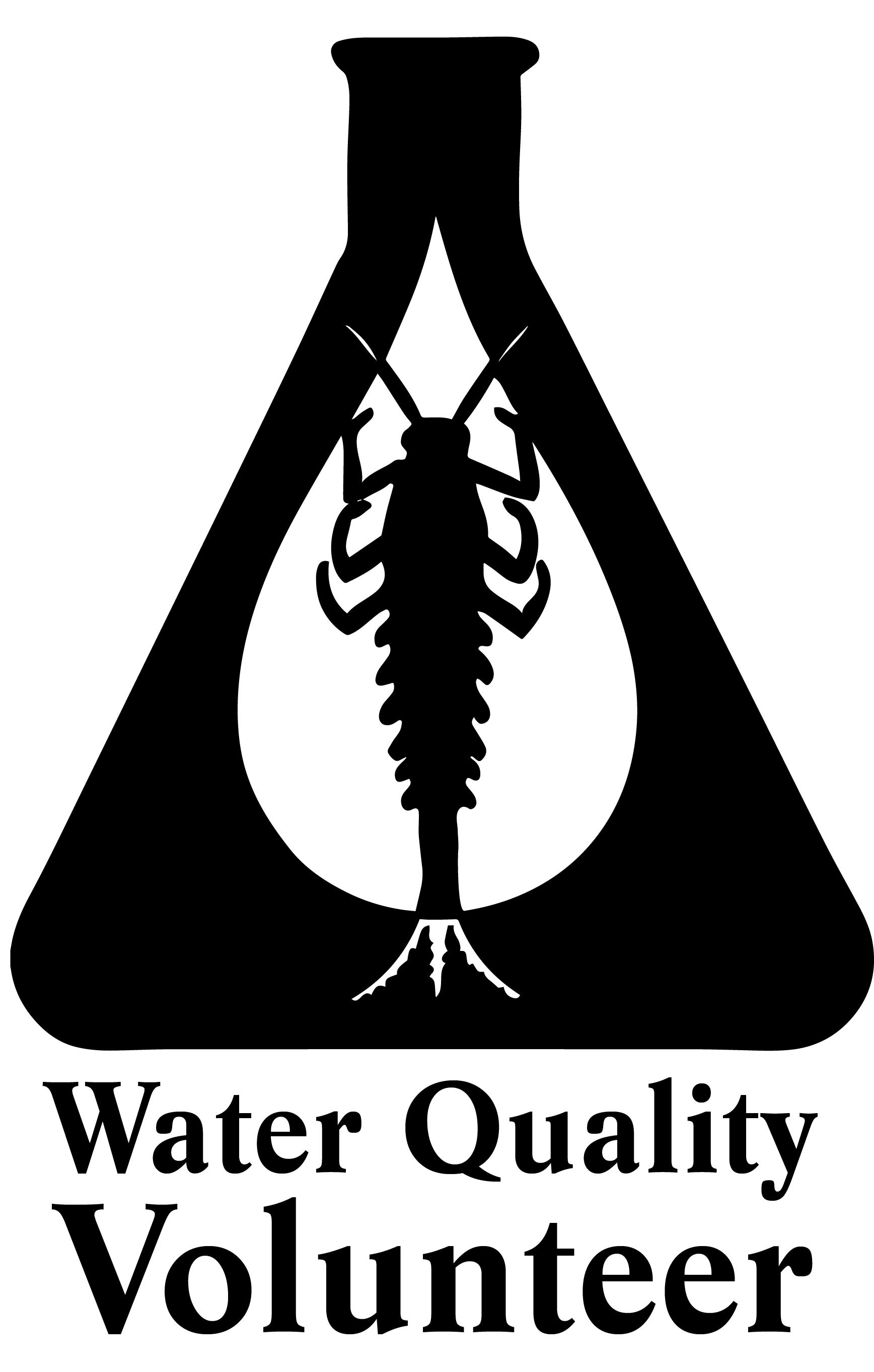stream team activities

want to get involved-learn more here!
Litter Pickups
Litter pickups are the most popular activity Stream Teams participate in. Litter pickups can range in scale from cleaning up the stream in your backyard to highly coordinated, large-scale watershed-wide events. Here are a few documents to help you on your way.
How to Conduct a Litter Pickup
Team Created Resources
Big River Cleanup Manual by Missouri River Relief
Safety Briefing by Greenway Network
adapted from Missouri River Relief
Site Scouting Report by Greenway Network
Special Handling Reference List by Greenway Network
Storm Drain Stenciling
Storm drains are sometimes misused for paint, motor oil, and yard waste disposal. People are unaware they lead to nearby lakes, streams, rivers, or even sinkholes, which are direct conduits to groundwater.
Stream Teams around the state are organizing storm drain stenciling and community education programs. The stenciled message "Dump No Waste, Drains to Stream," provides a visible reminder of the consequences of improper waste disposal in storm drains.
Storm Drain Stenciling How-To Manual (PDF)
Tree Planting
Trees growing along streams benefit humans, wildlife, fish, and the stream. Whether you are interested in reducing erosion and sedimentation, providing wildlife and fish habitat, or the occasional harvest of timber, allowing trees to grow near streams has many benefits.
Registered Stream Team members are eligible to receive trees for stream projects at no charge through the Missouri Department of Conservation’s George O. White State Nursery for riparian and streamside plantings. Orders are accepted September 1 - April 15 each year.
Appropriate projects include:
- Stream bank stabilization and/or riparian corridor planting
- Wildlife habitat improvement
- Greenway/stormwater catchment/watershed runoff areas
If your adopted stream could benefit from some tree planting, here is what you need to do:
1. Determine which tree species to plant:
- Tree seedlings available to Stream Teams are limited to those listed in the Guide to Streamside Tree Planting
- Please contact your local Forester or Private Land Conservationist for assistance with species selection and project assistance.
2. Obtain permission from landowners where your project will be focused if not on your own property:
3. Submit a Stream Team ACTIVITY REPORT under “planning for events”:
- Include a map or description of the area you will be planting trees in your activity report, and a plan for watering your seedlings.
4. Order your tree seedlings:
- Acquire a tree order form by visiting the MDC website at mdc.mo.gov/trees-plants/tree-seedlings/order-seedlings.
- THIS IS IMPORTANT! Make sure you select Stream Team under Customer Type and list your Stream Team number as the Organization name when you place your order; otherwise, you will be charged for your order.
- All orders will be reviewed by Stream Team staff for validity. You must be a registered member of an established Stream Team. If you are not sure if you are a registered Stream Team member, please contact your regional coordinator.
5. Follow the instructions included with your trees to ensure their survival.
6. Submit a Stream Team ACTIVITY REPORT for your time spent planting your trees. We NEED to tally your accomplishments. Failure to properly report will result in cancellation of future orders.
REMEMBER, these free trees are only available for Stream Team projects.
Adopt-An-Access
Adopt-An-Access allows groups and individuals to adopt Missouri stream and lake accesses. It's a great way to provide a valuable community service and develop cooperative relationships with agencies responsible for maintaining the accesses.
We all benefit from reduced agency maintenance costs, cleaner, safer water access, and increased interaction between agencies and the surrounding community.
Frequently Asked Questions about the Adopt-An-Access Program.
How do I get started?
You can find information about Missouri Department of Conservation (MDC) accesses at the MDC Atlas Website. Please contact the appropriate Regional Office, Area Manager, or Stream Team coordinator to talk about a possible adoption: Coordinators Map
The Adoption Agreement offers several options for providing maintenance at the access. The agreement offers flexibility for the adopter and the area manager to arrive at conditions that are mutually beneficial. The Area Manager will be happy to meet with you to discuss these options and determine the extent to which you are able to participate.
If the adopter is a group, it's important that the person who will be the primary contact with the Area Manager participate in the discussion.
What are some of the benefits?
Adopters automatically become Stream Teams, unless they elect not to when completing the adoption agreement. As a Stream Team, you become eligible for numerous additional benefits.
Teams can receive a wide variety of incentive items, including T-shirts, bandanas, pens, pencils, patches, and more. Supplies for litter pickups, storm drain stenciling, and other activities are also provided. Training and equipment is provided for Teams interested in Water Quality Monitoring. Other workshops are frequently offered, including Tree Planting, Law and Advocacy, Understanding Streams, Fish and Crayfish Identification, and Conducting Litter Pickups.
Already an Adopter?
Find out how to renew your agreement here: Renew an AAA Agreement
Streambank Stabilization
A tree revetment, made by anchoring trees along a streambank, is an inexpensive, effective way of stopping streambank erosion. The trees greatly slow the current along the eroding bank; this decreases erosion and allows silt and sand to be deposited along the bank and within the tree branches. The deposited material forms a good seed bed in which the seeds of river trees such as cottonwood and sycamore can sprout and grow. The resulting trees spread roots throughout the revetment and streambank. By the time the revetment trees have decayed, the bank should be stabilized by the roots of the living trees. As an added benefit, tree revetments provide excellent fish and wildlife cover.
Volunteer Water Quality Monitoring
The Volunteer Water Quality Monitoring (VWQM) Program allows citizens to learn about water quality and participate in one of Missouri Stream Team's most popular activities.
The program provides each volunteer with training and equipment for monitoring Missouri's rivers and streams' physical, biological, and chemical parameters.
Monofilament Recycling Recovery Program
Used fishing line poses a hazard to people, wildlife, and the environment. Berkeley Pure Fishing recycles used monofilament fishing lines and turns them into underwater fish structures, tackle boxes, and other fishing-related items.
The Stream Team Program partnered with Berkeley in the fall of 2005 to recycle used fishing lines. It now has recycling bins available for Stream Team members who are passionate about and committed to becoming MRRP monitors.
In order to keep track of bins that will be located throughout the state, the Stream Team Program will need a volunteer agreement to help us keep accurate records and to be sure you understand the obligation you are accepting regarding the MRRP sites you maintain.
What it takes to get involved in this important program:
1. Obtain permission from the Area Manager of any MDC Accesses, Parks and Recreation Superintendent for city lakes or accesses,
private land owners, or any entity with the authority to allow the installation of a bin on the property in order to establish an outdoor
bin site.
2. Completely fill out and return the Missouri Volunteer Agreement and indicate how many bins you want.
3. Maintain the bin by emptying it one or two times a month (or more often if needed, especially during peak fishing seasons).
4. Complete an Activity Report each time the bin is emptied. Activity Reports are available in every issue of our Channels newsletter,online, or hard copies can be mailed to you upon request.
Send completed Activity Reports to:
Missouri Stream Team
PO Box 180
Jefferson City, MO
65102-0180
5. Mail collected and cleaned (remove vegetation, lead, hooks, debris, etc.) monofilament line only to:
Berkley Recycling
1900 18th Street
Spirit Lake, IA
51360-1041,
or find an MRRP indoor receptacle/mailing box at a participating fishing and sporting goods store in your community.
Stream Team Academy Workshops
We have developed other training sessions (Stream Team Academy) for our volunteers. These were developed to enhance the volunteers’ understanding of stream ecosystems.
These include:
- Advocacy Workshop
- Crayfish Identification
- Fish Identification
- Fly Fishing for Invert Nuts
- Hellbender Workshop
- Herpetology Workshop
- Mussel Workshop
- Sediment Workshop
- EPT Workshop
- Groundwater
- Stream Team Curriculum Workshop
- Understanding Streams Workshop (discusses hydrology/stream dynamics, etc.)
- Water and the Law
- How to Build a Plywood Canoe Workshop
- GPS Workshop
Almost all of our training sessions are limited to one day. The exceptions are the Understanding Streams and Herpetology Academy classes (3 days and 2 days, respectively).
Stream Team Academy workshops are offered on an intermittent basis to registered Stream Team members at various locations as time, venues, and instructors are available. Registration information will be sent by Streamgram when these workshops are offered.
Please contact us if you have any questions:
Stream Team voice mailbox: 800-781-1989
Email: streamteam@mdc.mo.gov
Stream Team Mentoring
Stream Team Mentoring is an activity that can help a new Stream Team get their feet wet (literally!) and help them meet other Teams in their area. A mentor takes a special interest in helping another person or group thrive by providing guidance and support.
Photo Point Monitoring
Photographing your stream is a basic monitoring technique anyone can participate in. While photographs cannot tell the entire story about a situation, project, or practice, much information can be gathered from photographs taken at the same point over several years.



